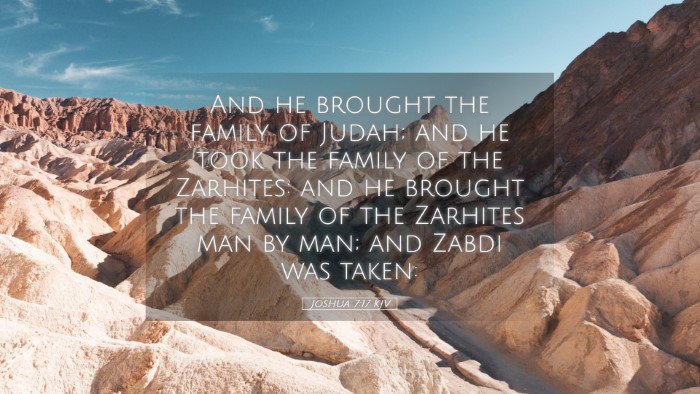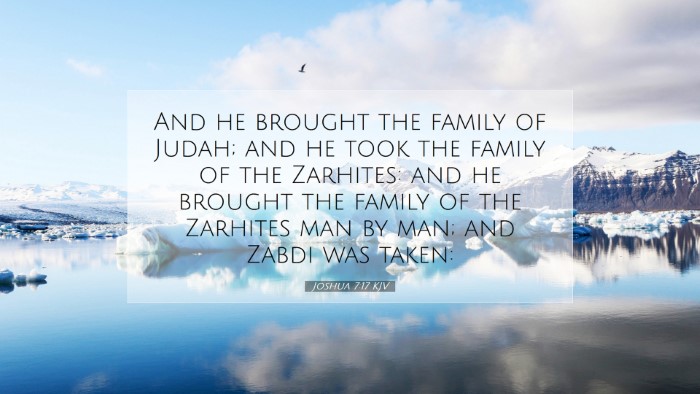Commentary on Joshua 7:17
Verse Text: "And he brought the family of Judah; and he took the family of the Zerahites: and he brought the family of the Zerahites man by man; and Achan the son of Carmi, the son of Zabdi, the son of Zerah, of the tribe of Judah, was taken."
Introduction
This verse is a pivotal point in the narrative of Israel's conquests after entering the Promised Land. It follows the defeat at Ai, which was attributed to Achan’s sin. In this commentary, we will explore insights from public domain sources, particularly the commentaries of Matthew Henry, Albert Barnes, and Adam Clarke. This examination will delve into the implications of Achan's act of disobedience, the process of divine judgment, and the broader theological insights pertinent to sin and its consequences in the community of faith.
Achan's Sin and Its Consequences
In the preceding chapters, the Israelite community experienced a miraculous victory at Jericho, but this victory was marred by Achan’s transgression. The sin of Achan, who took forbidden items from Jericho, led directly to Israel's subsequent defeat at Ai. This verse serves as a moment of divine scrutiny where the Lord exposes the cause of Israel's failure.
- Matthew Henry's Reflection: Henry emphasizes that God’s method of revealing sin is thorough and precise. He reflects on how God meticulously narrows down the families of Israel until He identifies Achan, underscoring the notion that sin does not go unnoticed by God. Each step taken in this process demonstrates God's justice, ensuring that the sinner is publicly acknowledged and dealt with.
- Albert Barnes' Take: Barnes points out the importance of corporate responsibility in Israel. He notes how Achan’s individual sin affected the entire nation, illustrating a key principle of communal accountability in the covenant community. The selection process highlighted the reality that one person's transgression can lead to collective consequences.
- Adam Clarke's Analysis: Clarke elaborates on the genealogy provided in this verse, elucidating Achan’s lineage to underscore the serious nature of his disobedience. By tracing Achan back to notable ancestors, the text suggests that his action was not just an act of individual failure but a failure that reflected poorly on his family and tribe.
The Process of Selection
The deliberate method by which Achan was singled out is critical in understanding the theological implications of divine judgment. The use of methods such as casting lots indicates God's direct involvement in the process, allowing Israel to see His hand at work in revealing the sinful individual.
- Henry's Insight: Henry notes the gravity of the lot-casting, suggesting that it was not merely a chance event but a divine appointment. He urges readers to recognize the seriousness of casting lots as a means of discerning God’s will. Every choice leads to profound spiritual implications.
- Barnes’ Commentary: Barnes highlights that this act was both a revelation and a condemnation of Achan’s act, showcasing God’s omniscience and the importance of obedience. The method served as a testament to the communal nature of decision-making in Israel, a reminder that individual actions ripple throughout the community.
- Clarke's Perspective: Clarke elaborates that the method of selection was a divine strategy designed not only to identify Achan but also to reaffirm God's authority among His people. It served to remind the Israelites that their victories were contingent upon their collective fidelity to God’s commands.
Theological Implications
This event raises essential questions regarding sin, judgment, and mercy. It reflects key themes present throughout Scripture regarding the nature of God's justice towards His covenant people.
- Corporate Sinfulness: As highlighted by both Henry and Barnes, Achan’s sin serves as a lesson on corporate sinfulness. Each member of the covenant community is interconnected, and one individual's sin can lead to national ramifications. This theme resonates throughout Scripture and is particularly poignant in the New Testament context of the Church.
- The Nature of Divine Justice: The meticulous process by which Achan was discovered illustrates God’s justice. Clarke points out that God does not act arbitrarily but follows a reasoned path to culpability. Divine judgment is portrayed as a necessary means of maintaining holiness within the community.
- Hope for Restoration: This passage invites reflections on themes of restoration and redemption. While Achan's sin leads to severe consequences, the narrative also allows for the understanding that repentance and atonement can restore the relationship between God and His people, a principle central to biblical theology.
Conclusion
Joshua 7:17 serves as a vivid reminder of the importance of obedience within the community of faith. The insights provided by Henry, Barnes, and Clarke encourage pastors, students, theologians, and Bible scholars to reflect on the implications of sin and collective responsibility, God's justice, and the ongoing need for communal holiness as a vital aspect of a faith-filled life.
As we study this passage, may we be reminded of the serious nature of our actions and their impact on those around us. Let us be diligent in our pursuit of holiness, understanding that our relationship with God is intricately linked to our commitment to obey His word.


